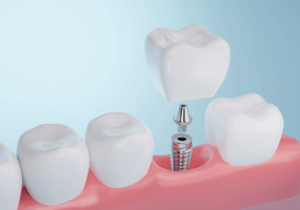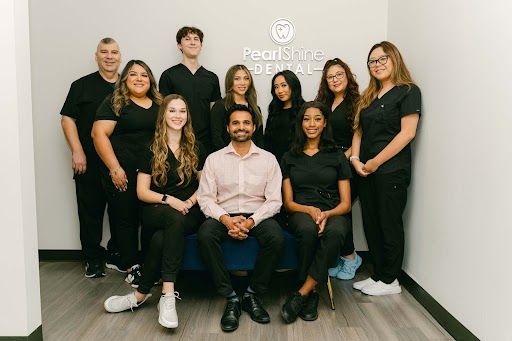Dental Implants
Dental implants offer a permanent solution for missing teeth, blending seamlessly with your natural smile.
Dental Implants at Pearl Shine Dental
Implant Dentist in Houston, TX
Dental implants are artificial teeth that can replace natural teeth lost due to damage, decay, or other reasons. Unlike removable dentures, dental implants are permanently attached to the jawbone and can restore up to 99% of the use and functionality of natural teeth. Typically, dental implants consist of three parts: the implant post, the abutment, and the restoration. First, a titanium implant post is surgically placed into the jawbone. Then, an abutment is attached to the post, which serves as an anchor for the custom-made replacement tooth (the restoration).
At our practice in Houston, TX, we understand that every patient is unique. We create custom-made restorations for each patient, using their precise measurements and specifications. Our implant specialist, Dr. Charolia, is highly skilled and experienced in implant fabrication, surgery, and final placement. He will work with you personally to ensure your restorations look beautiful, function flawlessly, and provide many years of reliable use.

The Dental Implant Process — Patient Testimonial
Dental Implant Topics
-
What kinds of dental implants exist?
Two types of dental implants are available, each designed to meet different needs. The most common type is the endosteal implant. The implant is surgically inserted directly into the jawbone, acting as an artificial root to hold a replacement tooth.
Another option is the All-on-4 implant. The entire top or bottom denture is supported on four strategically placed implants to help the teeth remain steady and secure. Using four implants has several advantages, including faster recovery time and reducing the likelihood of complications from possible implant failure.
-
What are the benefits of dental implants?
Dental implants offer numerous benefits over other tooth replacement options:
Improved Oral Health: Unlike bridges, implants do not require altering adjacent teeth, preserving more of your natural tooth structure.
Durability and Reliability: Implants are designed to last many years and are as strong as natural teeth when properly cared for.
Natural Look and Feel: Implants are nearly indistinguishable from your natural teeth, both in appearance and function.
Enhanced Comfort and Confidence: Implants eliminate the discomfort and insecurity often associated with dentures, allowing you to eat, speak, and smile with ease.
More Questions?
If you have more questions about your implant options, please contact our office and we will be happy to discuss further.
See All Dental Services Contact Pearl Shine Dental Schedule Online

